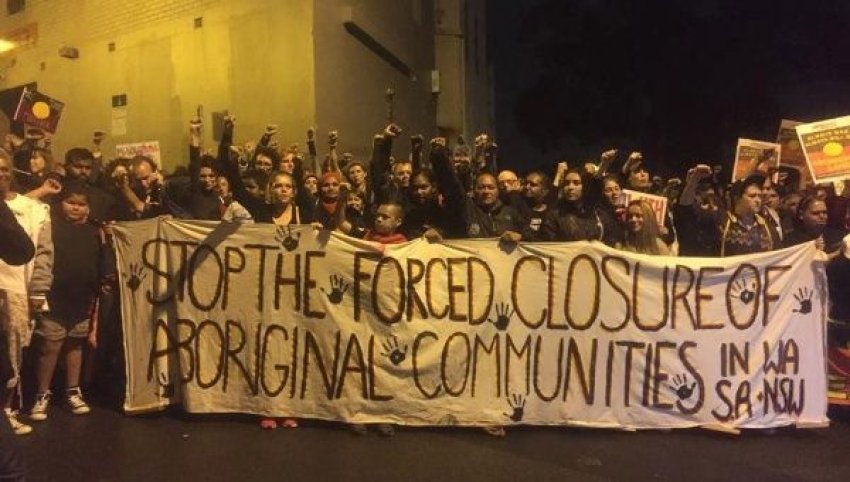
Thousands of people took to the streets of Melbourne and Sydney on April 10 to protest against the forced closure of remote Aboriginal communities.
In Melbourne, between 5000 and 10,000 people responded to the call by Warriors of the Aboriginal Resistance (WAR) to oppose the ethnic cleansing of remote Aboriginal communities by the federal, WA, SA and NT governments, on the grounds that the communities are not “economically sustainable”.
The campaign against the government's policy, which includes denying services to Aboriginal communities that are provided as basic rights to non-Indigenous communities, has escalated since PM Tony Abbott described Aboriginal people living on what has been their tribal land for tens of millennia as a “lifestyle choice”.
“For those living in the communities designated as 'unsustainable', the forced closures represent a genocidal attack on culture and connection to land that constitutes an unambiguous breach of fundamental human rights and basic notions of human decency.
“For every other self-respecting Aboriginal person, the forced closures represent the disrespect and disregard that government has for Aboriginal people. The forced closures reinforce the message that Aboriginal people cannot have freedom on this continent until we have self-government,” WAR said in an April 10 statement.
In Sydney, 2000 people gathered in Belmore Park to protest the closures of Aboriginal Communities in WA and SA. In the most militant Aboriginal rights rally Sydney has seen since massive protests against the bicentenary celebrations in 1988, Aboriginal people came from across NSW including La Peruse, Mt Druitt, and Dubbo to take part. A proud Maori contingent was present. The protest marched to Redfern Tent Embassy, not deterred by pouring rain. The rally began with a dancing ceremony.
The chair of the rally, Felon Mason, from the Redfern Tent Embassy, spoke about community closures, deaths in custody, police harassment, and moving Aboriginal people from the inner city. He said that these injustices are reason for communities to continue to protest and rally together.
Ebony Hill, a Sydney University law student from the Jabirr Jabirr and Gooniyandi nations, from Broome, WA, spoke passionately of the history of displacement in WA since the colonisation. She spoke about the overproduction of cattle and displacement by the mining industry and lauded communities' resilience in the fight against ongoing attacks by big business against Indigenous land.
The rally was called on to send their healing thoughts for Ray Jackson, from the Indigenous Social Justice Association who was due to speak but absent due to being in hospital suffering from pneumonia.
Graham Merritt, a Nyoongar-Yamaji man from Western Australia, who has campaigned for years around Black deaths in custody, spoke against high Indigenous incarceration rates and murders in prison.
Albert Harnett, an activist supporting the Grandmothers Against Child Removals, spoke at Belmore park and Redfern Tent Embassy. Jenny Munro, Redfern Tent Embassy activist, gave a passionate speech condemning the closures, calling on people to help the Tent Embassy, and give donations to WA communities.
Barbara Shaw, from the Arrente, Kaytetye, Warrumunga and Warlpiri peoples in the NT, and a leader of the campaign against the NT intervention, flew from Alice Springs to speak at the event.
NSW Greens MP David Shoebridge gave a speech offering his party’s support.
Rebel Hanlon, assistant secretary of the NSW construction division of the CFMEU denounced capitalism’s role in the oppression of Indigenous people, including mining companies' land grabs and Deicorp, the developers threatening to move Indigenous people off the Block in Redfern.
He pledged the unions support for the campaign to maintain Aboriginal housing in Redfern. A contingent of Maori construction workers gave an energetic solidarity Haka.
One incident of police violence took place against a Redfern Tent Embassy activist who was arm wrestled by two police officers and squashed up onto a police horse. She was released shortly after.
The next nationwide rallies to stop the closures will take place on May 1.